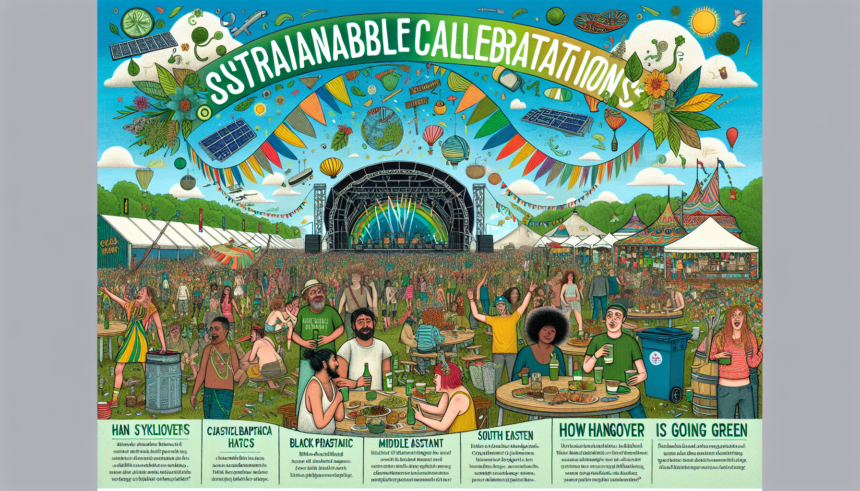<!DOCTYPE html>
<html lang="en">
<head>
<meta charset="UTF-8">
<meta name="viewport" content="width=device-width, initial-scale=1.0">
<title>Sustainable Celebrations</title>
<style>
body { font-family: Arial, sans-serif; line-height: 1.6; color: #333; }
h1 { color: #2E8B57; }
h2 { color: #3CB371; }
p { margin-bottom: 20px; }
ul { margin-bottom: 20px; }
</style>
</head>
<body>
<h1>Sustainable Celebrations: How HangOver Festival is Going Green</h1>
<p>In an era where the effects of climate change are more apparent than ever, the need for sustainable practices in all areas of life is becoming increasingly urgent. From corporate operations to individual habits, the shift towards sustainability is a global movement. One area that has seen significant transformation is the event industry, specifically music festivals. Among these, the HangOver Festival is leading the way by championing green initiatives that aim to reduce environmental impact while setting new standards for sustainability.</p>
<h2>Understanding the Environmental Impact of Festivals</h2>
<p>Music festivals are a source of joy and entertainment for many but can also be significant sources of environmental degradation. The influx of attendees often results in substantial waste generation, carbon emissions from travel, and environmental disruption. These events traditionally leave a large carbon footprint due to factors like energy consumption, waste production, and the transportation of both fans and equipment.</p>
<p>Recognizing these adverse effects, festival organizers worldwide are beginning to implement measures to lessen their environmental impact. Among these pioneers is the HangOver Festival, an event known for its focus on sustainability and eco-friendly practices.</p>
<h2>The Green Transformation of HangOver Festival</h2>
<p>HangOver Festival's green transformation can be attributed to a comprehensive strategy encompassing waste management, energy use, transportation, and food and beverage services. The organization's commitment to sustainability is embedded in its planning, execution, and post-event activities.</p>
<h3>1. Waste Management</h3>
<p>The festival has implemented a rigorous waste management program designed to minimize the waste sent to landfills. Recycling stations are set up throughout the venue, making it easy for attendees to dispose of their waste responsibly. Moreover, the festival promotes a no-single-use-plastics policy, encouraging vendors to use biodegradable materials and consumers to bring reusable containers.</p>
<h3>2. Renewable Energy Use</h3>
<p>Energy consumption is a critical aspect of any large-scale event. HangOver Festival has made significant strides by transitioning to renewable energy sources. Utilizing solar panels and other green technologies, the festival aims to power the event sustainably. This initiative not only reduces emissions but also serves as an educational platform, showcasing the potential of renewable energy in action.</p>
<h3>3. Sustainable Transportation</h3>
<p>Transportation is another major concern when it comes to sustainability. To tackle this, HangOver Festival offers incentives for carpooling and promotes the use of public transport. Additionally, the festival collaborates with environmentally-friendly transport services to facilitate attendee travel, further reducing the event's carbon footprint.</p>
<h3>4. Eco-Friendly Food and Beverage</h3>
<p>The festival's commitment to sustainability extends to its food and beverage offerings. Vendors are encouraged to source locally-grown produce and provide vegetarian and vegan options. This not only supports local farmers but also reduces the carbon emissions associated with transporting food products over long distances. Moreover, the use of compostable plates and cutlery is actively promoted to lessen waste.</p>
<h2>Engaging Attendees in Sustainability Initiatives</h2>
<p>One of the most crucial aspects of HangOver Festival's green journey is the engagement of attendees. The event ensures that festival-goers are not only passive participants but active contributors to the sustainability agenda.</p>
<h3>Eco-Conscious Fashion</h3>
<p>Festival fashion is often fast and temporary, contributing to waste. HangOver Festival advocates for sustainable fashion by encouraging attendees to wear eco-conscious clothing. Through partnerships with sustainable fashion brands and hosting swap shops, the festival promotes a culture of mindful consumption.</p>
<h3>Education and Awareness</h3>
<p>A significant part of the festival's initiative is education. Workshops, talks, and displays are integrated into the event to raise awareness about environmental issues and sustainable practices. This educational approach empowers attendees to make informed choices not only during the festival but in their everyday lives.</p>
<h2>The Impact of the Green Transition</h2>
<p>The efforts made by HangOver Festival have not gone unnoticed. The festival has substantially reduced its carbon footprint and waste output, setting a benchmark for other events. Furthermore, the green transformation has attracted an environmentally-conscious audience, eager to participate in an event that aligns with their values.</p>
<p>The festival's success has demonstrated that entertainment and sustainability can coexist and even thrive together. By integrating eco-friendly practices, the festival has not only minimized its environmental impact but also enhanced the overall experience for its attendees. The sense of community and shared purpose in protecting the environment adds an enriching layer to the festival atmosphere.</p>
<h2>Conclusion</h2>
<p>The transition towards sustainable festivals, as exemplified by HangOver Festival, represents a significant shift in the event industry. By prioritizing green practices, such festivals not only contribute to environmental preservation but also advocate for a global movement towards sustainability. The HangOver Festival, with its comprehensive approach to eco-friendly practices, serves as a model for other events worldwide.</p>
<p>Embracing sustainability in celebrations doesn't compromise the fun and excitement associated with festivals. Instead, it enhances these experiences by adding a layer of responsibility and awareness, ensuring that future generations can continue to enjoy these cultural and social phenomena.</p>
<h2>FAQs</h2>
<h3>1. What measures are in place to minimize waste at HangOver Festival?</h3>
<p>The HangOver Festival has implemented several measures to minimize waste, including establishing recycling stations throughout the venue and promoting a no-single-use-plastics policy. Vendors are encouraged to use biodegradable materials, and attendees are urged to bring reusable containers.</p>
<h3>2. How does HangOver Festival use renewable energy?</h3>
<p>The festival utilizes solar panels and other green technologies to power its events. By transitioning to renewable energy sources, it aims to reduce emissions significantly while demonstrating the potential of sustainable energy in large-scale events.</p>
<h3>3. What are some eco-friendly transport options promoted by the festival?</h3>
<p>The festival encourages carpooling, use of public transport, and partners with environmentally-friendly transport services to facilitate travel for attendees. These measures help in reducing the event's overall carbon footprint.</p>
<h3>4. How does HangOver Festival support sustainable food practices?</h3>
<p>The festival promotes the use of locally-grown produce and offers vegetarian and vegan options to support sustainable food practices. It encourages vendors to use compostable plates and cutlery to minimize waste and supports local farmers, thus reducing the carbon emissions associated with food transportation.</p>
<h3>5. How can attendees participate in the festival's sustainability efforts?</h3>
<p>Attendees can participate in sustainability efforts by wearing eco-conscious clothing, using the recycling facilities provided, using reusable containers, and engaging in educational workshops and discussions on sustainability offered at the festival.</p>
</body>
</html>Sustainable Celebrations: How HangOver Festival is Going Green

Leave a comment




